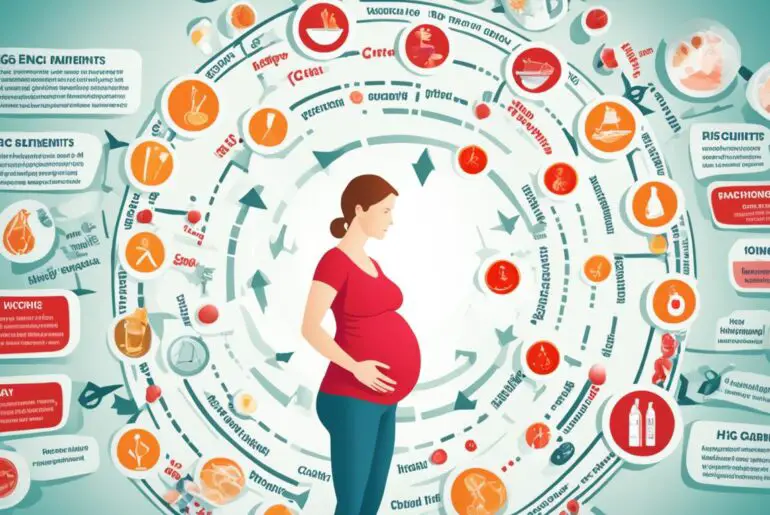Did you know that the HCG diet is often associated with pregnancy, but it is not safe or recommended for expectant mothers? While the HCG hormone is produced during pregnancy, the controversial weight loss plan that combines illegal HCG supplements or hormone injections with an extremely low-calorie diet poses potential risks to both the mother and the developing baby.
During pregnancy, it is crucial to prioritize the health and wellbeing of both mother and baby. The HCG diet, which involves severe calorie restriction, is not considered a safe or effective method of weight loss for expectant mothers. The U.S. FDA has not approved HCG supplements for weight loss, and health experts discourage pregnant women from trying the HCG diet due to its potential risks and lack of evidence for effectiveness.
Key Takeaways:
- The HCG diet, a controversial weight loss plan, is not safe or recommended for expectant mothers.
- Pregnant women should prioritize the health and wellbeing of both themselves and their babies.
- The U.S. FDA has not approved HCG supplements for weight loss during pregnancy.
- Health experts caution against the HCG diet due to potential risks and lack of evidence for effectiveness.
- It is important to explore safer and more appropriate alternatives for weight management during pregnancy.
Understanding the HCG Diet
The HCG diet is a controversial weight loss plan that combines manufactured HCG supplements or injections of the HCG hormone with an extreme reduction in calories. This low-calorie diet is divided into three phases: the loading phase, weight loss phase, and maintenance phase.
During the loading phase, individuals consume high-fat, high-calorie foods while starting HCG hormone supplementation. This phase typically lasts for two days. Following the loading phase, the weight loss phase begins, which involves consuming either 500 or 800 calories per day, spread over two meals. The duration of this phase can vary, but it typically ranges from three to six weeks, depending on individual goals and preferences.
The maintenance phase is the final stage of the HCG diet and aims to gradually increase calorie intake while discontinuing HCG supplementation. This phase helps stabilize weight and transition individuals to a more sustainable eating plan. It usually lasts for three weeks.
The HCG diet claims to cause rapid weight loss, with some proponents reporting up to one pound of weight loss per day. However, experts argue that the weight loss is primarily due to the extreme calorie restriction, rather than the HCG hormone itself. While initial weight loss can be significant, it is crucial to note that the long-term effectiveness and safety of the HCG diet remain highly debated.
In the next section, we will explore the safety concerns and FDA warnings associated with the HCG diet.
Safety Concerns and FDA Warnings
When considering any weight loss plan, it is essential to understand the safety concerns associated with it. The HCG diet, in particular, has raised significant concerns among experts and regulatory bodies like the U.S. Food and Drug Administration (FDA).
The FDA has only approved prescriptions for HCG drugs for the treatment of female infertility. This means that any over-the-counter HCG products marketed for weight loss are not FDA-approved and, therefore, considered illegal.
“The FDA has issued a warning regarding the safety and misleading weight-loss claims of HCG supplements sold for weight loss purposes.”
This FDA warning about HCG supplements emphasizes the importance of being cautious when considering these products. The FDA’s warning indicates that over-the-counter HCG supplements for weight loss may pose potential health risks to individuals.
It is crucial to prioritize your well-being and ensure that any weight loss method you choose aligns with regulated standards and approved medications. Let’s explore the legality, effectiveness, and potential risks associated with the HCG diet further in the following sections.
The HCG Diet Phases

The HCG diet consists of three phases: loading phase, weight loss phase, and maintenance phase. Each phase plays a vital role in the overall success of the diet plan. Let’s dive deeper into each phase and understand their significance.
Loading Phase
The loading phase is the initial phase of the HCG diet. During this phase, individuals are encouraged to consume high-fat, high-calorie foods for a period of 2-3 days. This phase helps prepare the body for the calorie-restricted weight loss phase that follows. It may seem counterintuitive to indulge in calorie-rich foods, but it is crucial for the effectiveness of the diet.
“During the loading phase, individuals consume high-fat, high-calorie foods while starting HCG hormone supplements.”
Weight Loss Phase
The weight loss phase is the most challenging and restrictive phase of the HCG diet. It involves consuming either 500 or 800 calories per day, spread over two meals. The calorie intake is carefully structured to ensure optimal weight loss while maintaining adequate nutrition. This phase typically lasts for 3-6 weeks, depending on individual goals and progress.
“The weight loss phase involves consuming either 500 or 800 calories per day, spread over two meals.”
Maintenance Phase
The maintenance phase is the final phase of the HCG diet. After completing the weight loss phase, individuals gradually increase their calorie intake while discontinuing HCG supplementation. This phase aims to stabilize the achieved weight loss and transition individuals into a long-term, sustainable eating pattern. The duration of the maintenance phase varies but can range from 3 weeks to a few months.
“The maintenance phase gradually increases calorie intake while discontinuing HCG supplementation.”
The HCG diet phases are designed to optimize weight loss while minimizing potential risks. Understanding and following each phase is crucial for achieving the desired results. The loading phase prepares the body for the restricted calorie intake in the weight loss phase, while the maintenance phase focuses on stabilizing the weight loss and establishing healthy habits moving forward.
Foods Allowed and Restricted on the HCG Diet
When following the HCG diet, it is important to adhere to specific food guidelines. The diet restricts certain foods while allowing others that are more suitable for the desired weight loss goals. By understanding the food restrictions and approved options, individuals can effectively manage their diet and maximize the benefits of the HCG plan.
Allowed Foods
On the HCG diet, individuals are allowed to consume lean proteins, approved vegetables, approved fruits, and specific seasonings. These foods provide essential nutrients while aligning with the low-calorie requirements of the diet.
Lean proteins are a crucial component of the HCG diet. They include options such as skinless chicken breast, white fish (like tilapia or cod), and extra-lean beef. These proteins offer satiety and support muscle maintenance while keeping calorie intake in check.
Approved vegetables include nutrient-dense choices like spinach, broccoli, and asparagus. These vegetables provide essential vitamins and minerals while offering a satisfying crunch and variety to the diet.
Approved fruits on the HCG diet include berries, such as strawberries and blueberries, as well as apples. These fruits are lower in sugars compared to other options and can be enjoyed as a refreshing snack or added to meals for added flavor.
For seasoning, individuals can use salt, pepper, and other non-caloric options to enhance the taste of their meals without compromising the diet’s effectiveness.
Restricted Foods
The HCG diet prescribes certain food restrictions to maximize weight loss and promote a healthier lifestyle. Restricted foods include high-calorie items, dairy products, carbohydrates, fats and oils, sugary foods, and desserts.
High-calorie items such as fried foods, processed snacks, and sugary beverages should be avoided, as they can hinder weight loss and contribute to calorie intake beyond the desired limit.
Dairy products are generally restricted on the HCG diet due to their higher calorie and fat content. However, there are alternatives available for individuals looking for dairy-free options.
Carbohydrates, including bread, pasta, rice, and potatoes, are limited or eliminated on the HCG diet. These foods are typically higher in calories and can interfere with the desired weight loss results.
Fats and oils, including butter, cooking oils, and dressings, are restricted due to their high calorie content. However, there are ways to incorporate healthy fats, such as avocado, in moderation to still enjoy some flavor and nutritional benefits.
Sugary foods and desserts, including candies, cakes, and ice cream, should be avoided during the HCG diet. These high-sugar options can spike insulin levels and hinder weight loss progress.
By adhering to the allowed and restricted foods on the HCG diet, individuals can effectively manage their calorie intake and maximize the benefits of the plan.
| Allowed Foods | Restricted Foods |
|---|---|
| Lean proteins: chicken, fish, extra-lean beef | High-calorie items: fried foods, processed snacks |
| Approved vegetables: spinach, broccoli, asparagus | Dairy products: milk, cheese, yogurt |
| Approved fruits: berries, apples | Carbohydrates: bread, pasta, rice, potatoes |
| Seasonings: salt, pepper | Fats and oils: butter, cooking oils |
| Sugary foods and desserts: candies, cakes, ice cream |
Meal Planning on the HCG Diet
When following the HCG diet, meal planning plays a crucial role in achieving success. By carefully considering caloric intake, meal timing, and meal composition, individuals can optimize their weight loss journey. Let’s delve into the details of meal planning on the HCG diet.
The HCG diet recommends dividing calories between two meals per day, typically lunch and dinner. This approach allows for effective portion control and ensures that each meal is nutritionally balanced. By limiting the number of meals, individuals can focus on consuming the right foods in the right amounts.
During the weight loss phase of the HCG diet, the daily calorie intake is either 500 or 800 calories, depending on the specific protocol followed. Regardless of the calorie level, each meal should be carefully planned to include all the necessary components for a well-rounded diet.
Caloric Intake
The first step in meal planning on the HCG diet is determining the appropriate caloric intake for each meal. This calculation will depend on whether you are following the 500 or 800 calorie protocol. By adhering to these calorie limits, you can ensure that your body is in a state of caloric deficit, promoting weight loss.
Meal Timing
Establishing a consistent meal schedule is essential for success on the HCG diet. By sticking to a regular eating routine, you can regulate your metabolism and optimize nutrient absorption. Lunch and dinner are the recommended meal times as they allow for efficient utilization of calories throughout the day.
Meal Composition
The HCG diet emphasizes specific food groups to maximize weight loss and maintain a balanced diet. Each meal should include a portion of lean protein, a serving of vegetables, a piece of bread, and a serving of fruit.
Lean proteins such as chicken breast, fish, and extra-lean beef provide essential amino acids for muscle maintenance while offering a satisfying meal. Vegetables like spinach, broccoli, and asparagus are rich in vitamins and minerals while being low in calories. Including a piece of bread provides a source of complex carbohydrates, and a serving of fruit adds natural sweetness and additional nutrients to your meal.
Here is an example of a well-composed meal on the HCG diet:
| Meal Component | Food Selection |
|---|---|
| Lean Protein | Grilled chicken breast |
| Vegetable | Steamed broccoli |
| Bread | One slice of whole wheat bread |
| Fruit | One medium-sized apple |
Meal planning and preparation are keys to ensuring that you meet the specific dietary recommendations of the HCG diet. By allocating your calories wisely and including a variety of foods, you can create satisfying and nutritionally balanced meals.
Meal planning on the HCG diet enables better adherence to the program, supporting your weight loss goals. By carefully considering caloric intake, meal timing, and meal composition, you can optimize your nutrient intake while achieving maximum results from the HCG diet.
Effectiveness and Controversy of the HCG Diet

Research studies have shown that the effectiveness of the HCG diet is widely disputed. While proponents claim that the HCG hormone enhances weight loss, scientific evidence suggests that the primary factor behind the diet’s results is extreme calorie restriction.
A study published in the Journal of the American Medical Association (JAMA) found that participants who followed a 500-calorie per day diet without HCG injections experienced similar weight loss as those who followed the same diet with HCG injections. This indicates that the hormone may not contribute significantly to weight loss on the HCG diet.
Furthermore, health experts caution against the use of the HCG diet due to safety concerns. The U.S. FDA has not approved HCG supplements for weight loss, and over-the-counter HCG products are illegal. The lack of regulation and oversight raises concerns about the quality and safety of these products.
“The HCG diet is a controversial weight loss method that lacks substantial evidence supporting its effectiveness. Extreme calorie restriction, rather than the HCG hormone, appears to be the main driver of weight loss observed on the diet.”
In light of these factors, it is important to approach the HCG diet with caution and seek guidance from healthcare professionals before embarking on this weight loss method.
The Controversy Surrounding the HCG Diet
The HCG diet has sparked significant controversy within the medical and scientific communities. Critics argue that the diet’s extreme calorie restriction is unsustainable in the long term and may lead to nutrient deficiencies and disordered eating patterns.
Additionally, the lack of robust scientific evidence supporting the effectiveness of the HCG hormone in weight loss raises concerns about the diet’s claims. It is crucial to prioritize evidence-based approaches to weight loss and consult healthcare professionals for safer alternatives.
Comparing the HCG Diet to Other Weight Loss Methods
| Weight Loss Method | Effectiveness | Safety | Evidence-Based |
|---|---|---|---|
| HCG Diet | Controversial | Concerns about safety | Lack of substantial evidence |
| Calorie Restriction | Effective for weight loss | Safe with proper nutrition | Scientifically supported |
| Healthy Balanced Diet | Effective for sustainable weight loss | Safe and promotes overall well-being | Evidence-based guidelines |
When comparing the HCG diet to other weight loss methods, it is evident that there are alternative approaches with better safety profiles and scientific support. Prioritizing a balanced diet, regular physical activity, and consulting healthcare professionals can help individuals achieve their weight loss goals in a sustainable and healthy manner.
The Legality and Cost of HCG Products
https://www.youtube.com/watch?v=mJzl6NheRYk
When considering the use of HCG products for weight loss, it is important to understand the legality and cost implications. In the United States, over-the-counter HCG products marketed for weight loss are illegal. The U.S. FDA has only approved prescriptions for HCG drugs for the treatment of female infertility. These approved HCG drugs are legal and strictly regulated.
Unfortunately, the illegal use of HCG for weight loss makes it difficult to obtain accurate figures for the cost of HCG injections. Prices can vary depending on various factors such as the brand, dosage, and location. However, it is essential to consult a healthcare professional and obtain a prescription if HCG injections are deemed appropriate for medical purposes.
It is crucial to prioritize adherence to legal regulations and consult with qualified healthcare professionals to ensure your safety and well-being when considering HCG products for weight loss.
Note: The image below visually emphasizes the importance of legality and safety when using HCG products for weight loss.
| Key Points | Details |
|---|---|
| Legality of HCG Products | Over-the-counter HCG products for weight loss are illegal in the United States. |
| Approved HCG Drugs | Only HCG drugs approved by the FDA for female infertility are legal. |
| Illegal Use of HCG | Illegal use of HCG for weight loss makes it difficult to determine exact figures for HCG injections. |
Side Effects and Risks of the HCG Diet

The HCG diet, although claimed to be effective for weight loss, is associated with several side effects and risks that should not be overlooked. Severe calorie restriction, a key component of this diet, can lead to various adverse effects on the body.
Side Effects of the HCG Diet
- Headaches: Some individuals following the HCG diet report experiencing frequent headaches, which can be attributed to the drastic reduction in calorie intake.
- Fatigue: Extremely low-calorie consumption can lead to feelings of fatigue and overall weakness, making it difficult to maintain daily activities.
- Depression: The HCG diet’s restrictive nature can have negative effects on mental well-being, potentially leading to feelings of depression and low mood.
In addition to these side effects, the HCG diet’s severe calorie restriction can result in persistent hunger, which may contribute to unhealthy eating behaviors and disordered eating patterns.
Risks of the HCG Diet
The restrictive nature of the HCG diet can also lead to nutrient deficiencies, as the limited food options may not provide an adequate balance of essential vitamins, minerals, and macronutrients. This can negatively impact overall health and well-being.
Furthermore, the intense hunger experienced during the HCG diet can potentially lead to disordered eating and an unhealthy relationship with food. It is important to prioritize a balanced and sustainable approach to weight management rather than resorting to extreme measures like the HCG diet.
Considering the potential side effects and risks associated with the HCG diet, it is crucial to consult a healthcare professional before considering this weight loss method. They can provide guidance on safer and more sustainable alternatives that prioritize overall health and well-being.
Tips for Safely Following the HCG Diet

Before embarking on the HCG diet, it is crucial to prioritize thorough understanding of the diet plan and seek guidance from a healthcare professional. By doing so, you can ensure you are making informed decisions about your health and well-being.
HCG Diet Preparation
- Research and familiarize yourself with the HCG diet protocol, including the three phases: loading, weight loss, and maintenance.
- Consult with a healthcare professional to determine if the HCG diet is appropriate for your specific circumstances, taking into account any underlying health conditions.
- Stock up on the necessary supplies, including HCG supplements or injections, approved foods, and measuring tools.
Meal Preparation
Successful meal planning and preparation play a significant role in adhering to the HCG diet and achieving desired results. Here are some meal preparation tips to consider:
- Create a detailed meal plan that includes the approved foods and their appropriate portion sizes.
- Prepare meals in advance to avoid impulsive food choices and ensure adherence to the calorie restrictions.
- Opt for lean proteins, approved vegetables, and fruits to maintain a nutritious and balanced diet.
- Monitor your caloric intake carefully and track everything you consume to stay within the recommended limits.
Hydration
Proper hydration is essential for overall health and success on the HCG diet. Here’s how to stay hydrated:
- Drink an adequate amount of water throughout the day, aiming for at least eight glasses (approximately 64 ounces).
- Avoid sugary, carbonated, and caffeinated beverages as they can interfere with the effectiveness of the diet.
- Hydrate before and after your meals to promote proper digestion and avoid overeating.
Protocol Adherence
Strict adherence to the HCG diet protocol is crucial for optimal results and minimizing potential risks. Here are some tips to help you stay on track:
- Follow the recommended calorie restrictions specified for each phase of the diet diligently.
- Avoid cheating or deviating from the approved food list to maintain the intended effects of the HCG hormone.
- Monitor your progress regularly by weighing yourself, tracking measurements, and keeping a journal of your daily meals and experiences.
- Reach out to a support network or join online communities dedicated to the HCG diet to find guidance, motivation, and accountability.
By following these tips, thoroughly preparing for the HCG diet, planning your meals, staying hydrated, and adhering to the protocol, you can safely navigate the HCG diet and optimize your chances of success.
Conclusion
After examining the details of the HCG diet, it becomes evident that this weight loss plan is highly controversial and potentially unsafe. The combination of extreme calorie restriction and HCG supplementation raises concerns among health experts. While the diet may result in rapid weight loss, its safety and effectiveness are not recognized by professionals.
It is important to consider alternative, safer weight loss options that are backed by scientific evidence and approved by medical authorities. Consultation with a healthcare professional is crucial before starting any diet or weight loss plan to ensure it aligns with individual health needs.
HCG Diet Conclusion: Instead of opting for the HCG diet, individuals should focus on implementing a balanced and sustainable approach to weight loss through a combination of regular exercise, proper nutrition, and lifestyle changes. Taking a holistic approach is the key to achieving long-term weight management and overall well-being.
FAQ
Can pregnant women follow the HCG diet?
No, the HCG diet is not safe or recommended for expectant mothers. The extreme calorie restriction and use of HCG supplements or injections pose potential risks to the health of both the pregnant woman and the developing fetus. It is important for pregnant women to focus on maintaining a balanced and nutritious diet to support the healthy growth and development of their baby.
Is the HCG diet approved by the FDA?
The U.S. FDA has not approved HCG supplements or injections for weight loss. HCG drugs are only approved for the treatment of female infertility. The FDA has also issued a warning about the safety and fraudulent weight-loss claims of over-the-counter HCG products marketed for weight loss. These products are illegal and may pose health risks to individuals.
What are the phases of the HCG diet?
The HCG diet consists of three phases: the loading phase, the weight loss phase, and the maintenance phase. During the loading phase, individuals consume high-fat, high-calorie foods while starting HCG hormone supplements. The weight loss phase involves consuming either 500 or 800 calories per day, spread over two meals. The maintenance phase gradually increases calorie intake while discontinuing HCG supplementation.
What foods are allowed and restricted on the HCG diet?
The HCG diet allows lean proteins such as chicken, fish, and extra-lean beef, approved vegetables like spinach and broccoli, approved fruits like berries and apples, and seasonings like salt and pepper. Restricted foods include high-calorie items, dairy products, carbohydrates, fats and oils, sugary foods, and desserts.
How should meals be planned on the HCG diet?
The HCG diet recommends dividing calories between two meals per day, typically lunch and dinner. The 500 or 800-calorie intake should include a portion of lean protein, a vegetable, a piece of bread, and a serving of fruit. Meal planning and preparation ahead of time can help individuals adhere to the diet and meet the specific dietary recommendations.
Is the HCG diet effective?
The effectiveness of the HCG diet is widely disputed. Research studies have shown that weight loss achieved on the HCG diet is primarily due to extreme calorie restriction, not the HCG hormone itself. Health experts caution against its use due to safety concerns and lack of substantial evidence supporting its effectiveness. There are alternative, safer weight loss options available that should be considered instead.
Are over-the-counter HCG products legal and how much do they cost?
Over-the-counter HCG products for weight loss are illegal in the United States. Only prescriptions for HCG drugs approved by the FDA for female infertility are legal. The cost of HCG injections varies and can be expensive, but it is difficult to obtain exact figures due to the illegal use of HCG for weight loss. It is important to consult with a healthcare professional before considering HCG injections.
What are the side effects and risks of the HCG diet?
The HCG diet may cause side effects such as headaches, fatigue, and depression. Severe calorie restriction can result in intense hunger and may lead to disordered eating patterns. The restrictive nature of the diet may also lead to nutrient deficiencies and potentially contribute to unhealthy weight management practices. Prioritizing the health and well-being of both the body and the mind is crucial when considering any weight loss plan.
What are some tips for safely following the HCG diet?
Before starting the HCG diet, it is important to thoroughly understand the diet plan and seek guidance from a healthcare professional. Planning and preparing meals ahead of time, staying hydrated with water, and following the dietary protocol can help individuals safely navigate the HCG diet. Adherence to the protocol is crucial to minimize potential risks and achieve desired results.




